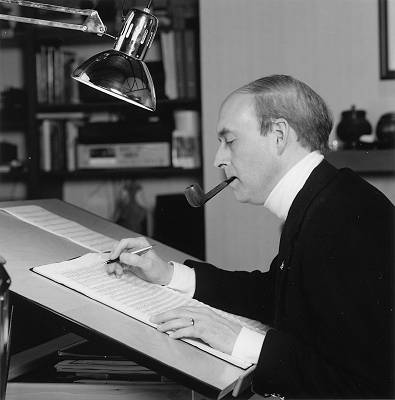|
<< -- 4 -- Carson P Cooman LETTING THE MUSIC GROW

CC: Although you've obviously been composing music of all kinds for many years, you've received greatest recognition and acclaim for your organ and choral works. Has your activity and recognition in that world had an impact on your other music?
DL: I believe it has. I was the last composer to be published by Franco Colombo (an absolutely wonderful man who was the first to publish Menotti and the only publisher to publish Varese's entire catalog). Both Mr Colombo and Sue Klein of Boosey & Hawkes both told me around the same time that, from their experience, it was true that when you have successes in one area of your catalog, the other works would tend to follow. I do believe, though, that it takes more time for this to happen. If a composer specializes in one area, be it band, orchestra or choral music, it is quicker for that composer to build a following, for one success often brings about more commissions in the area of the success. And, of course, our society loves to typecast! Ned Rorem has spoken of this often when he has been lauded as only a masterful song composer. (Never mind that his Pulitzer piece was an orchestral work!) And, of course, during his lifetime Leonard Bernstein had difficulty being taken seriously as a composer for anything other than music for Broadway. It is my belief, though, that if you write quality music that says something and do so in a variety of genre, it will all eventually find a following. It just takes more time and patience for this to happen.
CC: How does it feel to have written a work like Rubrics (1988) for organ which has truly entered the 20th century standard repertory for the instrument? Did you have any idea when you first wrote that work that it might be so successful?
DL: No -- I had no idea. I was so sick of it after completing it that I wanted to toss it! Paula, my wife, will confirm that. I tend to work on one piece at a time, though that doesn't mean I'm not thinking about other things or making sketches for other pieces. But I tend to focus intensely on only one piece. Thus, when I'm finished with a piece, I'm exhausted by it, ready for it to be finished and, often, just plain sick of it. With Rubrics, though, I'm truly glad that I didn't toss it!
I had no idea that it would have such success. You can never really predict that sort of thing. The five movements that make-up the organ suite entitled Rubrics have their extra-musical stimulus from instructional sentences found in the footnotes of the Episcopal Book of Common Prayer. As you well know, it is a trait of a great deal of my music that some sort of extra-musical stimulus is a part of the process. But I do like to think, though, that any success that Rubrics has had, comes from another extra-musical stimulus behind the suite's fourth movement, The Peace May Be Exchanged. When I created this movement the image in my mind was that of my father, to whom I was very close. He died in 1986 and was as close to a saint of a man as I have ever known. I'd still love to do a Requiem to honor him fully and I hope the opportunity may come along some day. But, until then, when I had the commission for Rubrics (commissioned in 1988 by the Pittsburgh Organ Artist Series for their tenth anniversary year), I felt the need to write something in the five movement suite that would, somehow, capture his own sense of Peace with himself as well as honor my relationship and deep love for him. So, if there's any real reason for the success of Rubrics, I'd like to think it's because of my father's extra-musical influence behind the fourth movement.

Dan Locklair
|
CC: Would you say it's accurate to see Rubrics as a piece which set up many of the elements of your compositional language for the organ works which have followed it?
DL: It did that, but there were several earlier pieces, including one of the earliest organ pieces (from 1978) entitled Inventions, which laid out the ultra economical use of musical material that since has become a part of my style. Inventions is really a concert piece for organ, unlike Rubrics which can be performed both in concert and in services of worship. I then began to apply those principles to all compositions that followed, including orchestral, chamber, solo and vocal works.
Continue >>
Copyright © 18 January 2005
Carson P Cooman, Rochester, NY, USA

|

